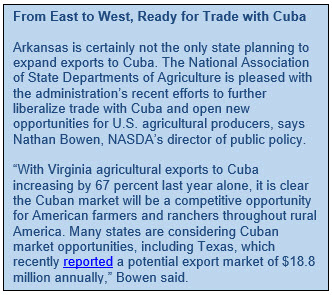WASHINGTON, March 23, 2016 - A wide variety of farmers and agribusinesses eagerly watched President Barack Obama’s historic trip to Cuba this week but the interest was especially high in the land of rice and poultry.
Arkansas – a state that ranks first in the nation in rice production, exporting more than 60 percent of that crop – and second in broiler production, is one of several states gearing up for the economic opportunities that could come as a result of an improved trading relationship with Cuba.
Last September, Arkansas Gov. Asa Hutchinson became the first U.S. governor to visit Cuba after President Obama restored diplomatic relations with the communist island nation. On Monday, he spoke to a group organized by the Cuba Consortium at an event at the Winthrop Rockefeller Foundation's headquarters on Arkansas' Petit Jean Mountain.
Hutchinson said his trip last fall produced "historic" meetings – when his group met with the U.S. ambassador in his residence, Cuban officials were also present, the first time they'd ever been there.
Located just 90 miles off the coast of Florida, Cuba represents a "great market opportunity" for U.S. exporters, and Arkansas in particular, Hutchinson said. "They have the highest per capita of rice consumption of any place in the world,” he said. The average Cuban eats 177 pounds a year, versus an American’s 46 pounds, he added.
Speaking of rice, he said: “They like our long grains that we have here in Arkansas… Whether you're talking about trade, tourism, investment of business, hotels or a whole host of businesses, there is opportunity in Cuba for investment.”
The governor expressed the view that Cuba, unlike other Communist countries, is still frozen in time economically. Although there has been some privatization of enterprises like barber shops and restaurants, he said, "It is still a centralized control and in my meeting with the Cuban officials they emphasized to me, and this is their language, 'We have still not forgotten the principles of the revolution.'" He blamed the half-century old trade embargo for fostering that philosophy.
 Ruben Ramos Arrieta, minister counselor of the Economic
and Trade Office at Cuba’s Embassy in Washington, disagreed. He told Agri-Pulse, "Having that kind of
belief is not having a clear understanding of reality and how Cuba has been
moving in the last 50 years. Thinking that Cuba is frozen in the 50s or in the
60s -- the criteria that the governor has -- this is not our belief. If you go
to Cuba, you can realize that the Cuban people are very proud of my country.
They are always moving forward."
Ruben Ramos Arrieta, minister counselor of the Economic
and Trade Office at Cuba’s Embassy in Washington, disagreed. He told Agri-Pulse, "Having that kind of
belief is not having a clear understanding of reality and how Cuba has been
moving in the last 50 years. Thinking that Cuba is frozen in the 50s or in the
60s -- the criteria that the governor has -- this is not our belief. If you go
to Cuba, you can realize that the Cuban people are very proud of my country.
They are always moving forward."
Hutchinson called for the embargo to be lifted gradually, starting with eliminating the ban on American companies selling to Cuba on credit. "Businesses should be able to negotiate a transaction if they want to take the risk," he said.
Cuba Consortium CEO Scott Campbell told Agri-Pulse that his group was formed about one year ago to provide an honest, candid and constructive dialogue about normalizing relations with Cuba, “and it just took off,” he said. “Our timing was awfully good, as it turned out."
Campbell also said he thought the embargo would be phased out. “Death by a thousand cuts, if you will. I think that will come; it's a trust-, it's a confidence-building measure.” But he added the U.S. has to be willing to open its market to Cuban goods, saying, “If we're not going to reciprocate, it's going to be hard for us to get much done."
Ramos said under normal conditions, the U.S. and Cuba would be natural trade partners; by normal, he said he means "to have the opportunity to buy agricultural products, and to sell agricultural products in my country in the U.S. market." He named cigars as an example, but also sugar, vegetables, honey and citrus, as well as Cuba's advances in biotechnology, saying Cuba has effective medicines to treat diabetes, ulcers and cancer.
#30
For more news, go to: www.Agri-Pulse.com
